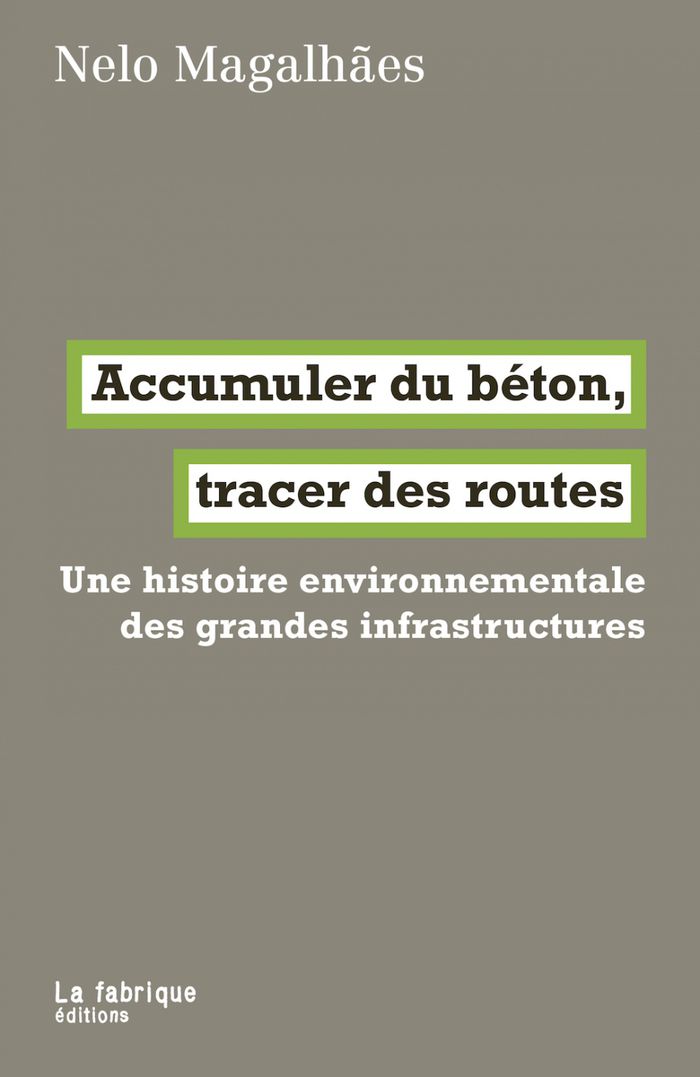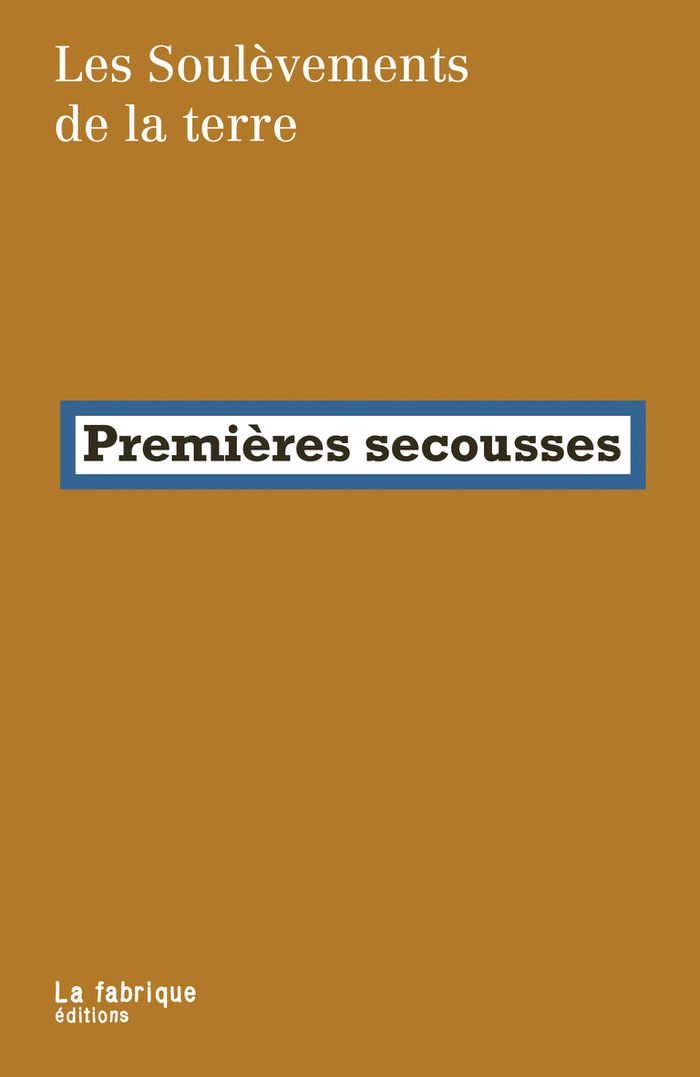$33.95
(disponible en magasin)
Résumé:
Cette histoire de la construction des infrastructures de transport en France révèle l'envers du décor et les conséquences environnementales de l'accélération commencée dans les années 1950. Alors que les conflits et controverses autour des projets de construction se multiplient, elle dévoile les manoeuvres de l'industrie cimentière et identifie les nouveaux enjeux sociaux(...)
Accumuler du béton, tracer des routes
Actions:
Prix:
$33.95
(disponible en magasin)
Résumé:
Cette histoire de la construction des infrastructures de transport en France révèle l'envers du décor et les conséquences environnementales de l'accélération commencée dans les années 1950. Alors que les conflits et controverses autour des projets de construction se multiplient, elle dévoile les manoeuvres de l'industrie cimentière et identifie les nouveaux enjeux sociaux et écologiques.
$25.95
(disponible sur commande)
Résumé:
Dans nos vies empressées, le Vivant est réduit à quelques aspects utilitaires ou distrayants. Or, comment sauver ce qu’on connaît mal ? Passant au crible plus d’une centaine d’idées fausses dans cet ouvrage clair, convivial et renseigné, Marc Mortelmans déconstruit une à une les idées reçues qui faussent notre rapport au Vivant et nous éloignent de lui. Ce manuel est(...)
En finir avec les idées fausses sur le monde vivant
Actions:
Prix:
$25.95
(disponible sur commande)
Résumé:
Dans nos vies empressées, le Vivant est réduit à quelques aspects utilitaires ou distrayants. Or, comment sauver ce qu’on connaît mal ? Passant au crible plus d’une centaine d’idées fausses dans cet ouvrage clair, convivial et renseigné, Marc Mortelmans déconstruit une à une les idées reçues qui faussent notre rapport au Vivant et nous éloignent de lui. Ce manuel est un premier pas vers la (re)connaissance, la réconciliation et l’harmonie.
Premières secousses
$27.95
(disponible sur commande)
Résumé:
Au fil des saisons, nous avons forme´ des corte`ges bigarre´s, muni·es de be^ches, de me´gaphones et de meuleuses, ve^tu·es de bleus de travail et de combinaisons blanches, escorte´·es par des oiseaux ge´ants… Nous avons traverse´ les bocages et les plaines, arpente´ les valle´es industrielles et le bitume des usines – et me^me fro^le´ les cimes alpines. Nous nous(...)
avril 2024
Premières secousses
Actions:
Prix:
$27.95
(disponible sur commande)
Résumé:
Au fil des saisons, nous avons forme´ des corte`ges bigarre´s, muni·es de be^ches, de me´gaphones et de meuleuses, ve^tu·es de bleus de travail et de combinaisons blanches, escorte´·es par des oiseaux ge´ants… Nous avons traverse´ les bocages et les plaines, arpente´ les valle´es industrielles et le bitume des usines – et me^me fro^le´ les cimes alpines. Nous nous soulevons pour de´fendre les terres et leurs usages communs. Contre les me´ga-bassines, les carrie`res de sable, les coule´es de be´ton et les spe´culateurs fonciers, nous voulons propager les gestes de blocage, d’occupation et de de´sarmement, pour de´manteler les filie`res toxiques. Nous nous soulevons parce que nous n’attendons rien de ceux qui gouvernent le de´sastre. Nous nous soulevons parce que nous croyons en notre capacite´ d’agir. Depuis des sie`cles, du nord au sud, des mouvements populaires se battent pour de´fendre une ide´e simple : la terre et l’eau appartiennent a` tou·tes, ou peut-e^tre a` personne. Les Soule`vements de la terre n’inventent rien ou si peu. Ils renouent avec une conviction dont jamais nous n’aurions du^ nous de´partir.
Agriculture industrielle
$26.95
(disponible en magasin)
Résumé:
Pourquoi les agriculteurs sont-ils toujours poussés à s’endetter ? Pourquoi les techniques agricoles semblent-elles incapables de s’adapter au dérèglement climatique? Pourquoi des pratiques polluantes sont-elles devenues la norme ? Alors que l’agriculture contemporaine ne cesse d’être en crise, il devient urgent d’en comprendre les causes historiques structurelles, de(...)
Agriculture industrielle
Actions:
Prix:
$26.95
(disponible en magasin)
Résumé:
Pourquoi les agriculteurs sont-ils toujours poussés à s’endetter ? Pourquoi les techniques agricoles semblent-elles incapables de s’adapter au dérèglement climatique? Pourquoi des pratiques polluantes sont-elles devenues la norme ? Alors que l’agriculture contemporaine ne cesse d’être en crise, il devient urgent d’en comprendre les causes historiques structurelles, de saisir les logiques capitalistes et industrielles qui écrasent les paysan·ne·s en laissant croire qu’un seul modèle agricole serait possible pour nourrir l’humanité. Jacques Caplat décrypte ce système délétère et dénonce l’imposture qui en est à l’origine. Il met en lumière les alternatives techniques et économiques qui existent, afin de dégager de nouveaux principes pour une agriculture réconciliée avec le vivant et les humains. Car une minorité de paysan·ne·s continuent à résister en France et à travers le monde. Il ne tient qu’à nous de les soutenir.
$32.95
(disponible en magasin)
Résumé:
Avec le réchauffement de la planète, le rôle géopolitique du climat se réaffirme et change de nature. Les conditions climatiques participaient d'un aléatoire heureux ou malheureux qui contribuait à faire ou à défaire les civilisations et les empires. Quand l'aléatoire devient systématique, les cartes de la puissance sont rebattues et les questions se multiplient : qui de(...)
Géopolitique et climat (2e édition)
Actions:
Prix:
$32.95
(disponible en magasin)
Résumé:
Avec le réchauffement de la planète, le rôle géopolitique du climat se réaffirme et change de nature. Les conditions climatiques participaient d'un aléatoire heureux ou malheureux qui contribuait à faire ou à défaire les civilisations et les empires. Quand l'aléatoire devient systématique, les cartes de la puissance sont rebattues et les questions se multiplient : qui de la démocratie ou de l’autoritarisme lutte le mieux contre le changement climatique? Quelles insécurités humaines celui-ci renforce-t-il? Des guerres climatiques peuvent-elles se produire? Le basculement planétaire vers la décarbonation va-t-il reconfigurer les rapports de pouvoir? Quels seront les gagnants et les perdants de cette recomposition du monde?
Carnage
$18.95
(disponible en magasin)
Résumé:
Jean-Marc Gancille expose un tableau sans concession de la relation que l’être humain a nouée avec le monde animal, fondée sur la domination et l’exploitation. Sacrifices religieux, collections et commerce d’animaux sauvages, domestication, utilisation à des fins militaires ou pour des expériences de laboratoires, captivité forcée dans les zoos et aquariums, chasse et(...)
mars 2025
Carnage
Actions:
Prix:
$18.95
(disponible en magasin)
Résumé:
Jean-Marc Gancille expose un tableau sans concession de la relation que l’être humain a nouée avec le monde animal, fondée sur la domination et l’exploitation. Sacrifices religieux, collections et commerce d’animaux sauvages, domestication, utilisation à des fins militaires ou pour des expériences de laboratoires, captivité forcée dans les zoos et aquariums, chasse et pêche récréatives, élevage intensif ou surpêche, etc. On n’en finit pas d’établir la liste des formes qu’adopte l’anthropocentrisme. L’auteur démontre que ce carnage n’est pas seulement un éternel enfer pour les animaux, mais aussi une tragédie pour l’espèce humaine (en raison de la destruction des écosystèmes), une négation immorale d’êtres sentients et une supercherie de l’industrie agroalimentaire (qui entretient l’idée que la consommation de protéines animales serait nécessaire).
Decolonial environmentalisms: Climate justice and speculative futures in Latinx cultural production
$43.95
(disponible sur commande)
Résumé:
In "Decolonial environmentalisms", David Vázquez argues that the mainstream environmental movement is implicated in racial capitalism, not least through its ignorance of environmental justice as it pertains to Latinx people. Through close readings of eco-minded novels, films, visual art, and short stories by Chicanx, Puerto Rican, Dominican, Cuban American, Peruvian, and(...)
juillet 2025
Decolonial environmentalisms: Climate justice and speculative futures in Latinx cultural production
Actions:
Prix:
$43.95
(disponible sur commande)
Résumé:
In "Decolonial environmentalisms", David Vázquez argues that the mainstream environmental movement is implicated in racial capitalism, not least through its ignorance of environmental justice as it pertains to Latinx people. Through close readings of eco-minded novels, films, visual art, and short stories by Chicanx, Puerto Rican, Dominican, Cuban American, Peruvian, and Central American culture makers, Vázquez surfaces diverse Latinx visions for an equitable and sustainable humanity. In the creations of Helena María Viramontes, Ester Hernández, Salvador Plascencia, the printmaking collective Dominican York Proyecto GRAFICA, and others, Vázquez locates a bracing critique of racist elisions and assumptions in hegemonic environmentalist thought.
$33.95
(disponible en magasin)
Résumé:
Human societies have always been deeply interconnected with our ecosystems, but today those relationships are witnessing greater frictions, tensions, and harms than ever before. These dynamics mirror those experienced by marginalized communities across the planet, but they also provide a foundation for transformative thinking and action to address these challenges. In(...)
juillet 2025
What is critical environmental justice? 2nd edition
Actions:
Prix:
$33.95
(disponible en magasin)
Résumé:
Human societies have always been deeply interconnected with our ecosystems, but today those relationships are witnessing greater frictions, tensions, and harms than ever before. These dynamics mirror those experienced by marginalized communities across the planet, but they also provide a foundation for transformative thinking and action to address these challenges. In this updated edition of his innovative contribution, David Naguib Pellow introduces a new framework for critically analyzing Environmental Justice scholarship and activism. In doing so he extends the field’s focus to topics not usually associated with environmental justice, including policing, incarceration, the Israel/Palestine conflict, and the Black Lives Matter movement, revealing that ecological violence is first and foremost a form of social violence, driven by and legitimated by social structures and discourses.
$38.95
(disponible sur commande)
Résumé:
Les mobilités sont l'un des premiers facteurs d'émission de gaz à effet de serre en France, et surtout le seul dont les émissions ne baissent pas, du fait d'un usage massif de la voiture thermique. Les propositions fusent pour parvenir à sa diminution ? : voiture électrique, vélo, transports publics, sobriété. Il y a cependant de très bonnes raisons de douter que ces(...)
mai 2025
Réussir la décarbonation des mobilités dans les territoires
Actions:
Prix:
$38.95
(disponible sur commande)
Résumé:
Les mobilités sont l'un des premiers facteurs d'émission de gaz à effet de serre en France, et surtout le seul dont les émissions ne baissent pas, du fait d'un usage massif de la voiture thermique. Les propositions fusent pour parvenir à sa diminution ? : voiture électrique, vélo, transports publics, sobriété. Il y a cependant de très bonnes raisons de douter que ces solutions seules produiront l'effet attendu. Ce n'est pas parce que l'intention est bonne que le résultat sera au rendez-vous. Rassemblant un ingénieur, un physicien, un économiste, un géographe et un spécialiste du développement territorial, ce livre montre que décarboner les mobilités exige une vision d'ensemble et prendra du temps. S'il existe bien des solutions pour des mobilités bas carbone, il faut qu'elles soient acceptables par la société, et finançables.
$27.95
(disponible en magasin)
Résumé:
Loin de se limiter à un simple état des lieux, les auteurs de ce recueil de textes ont comme objectif de répondre aux trois questions suivantes : « Peut-on résister? Pourquoi résister? Comment résister? ». La civilisation industrielle est en train de détruire la Terre ; le nier, c'est subir la domination d'une idéologie dont l'ambition est d'annihiler le vivant ou de le(...)
Écologie en résistance : Stratégies pour une terre en péril
Actions:
Prix:
$27.95
(disponible en magasin)
Résumé:
Loin de se limiter à un simple état des lieux, les auteurs de ce recueil de textes ont comme objectif de répondre aux trois questions suivantes : « Peut-on résister? Pourquoi résister? Comment résister? ». La civilisation industrielle est en train de détruire la Terre ; le nier, c'est subir la domination d'une idéologie dont l'ambition est d'annihiler le vivant ou de le réduire en esclavage. Ce recueil de discussions porte sur le changement de stratégie et de tactiques qui doit se produire si nous voulons construire une résistance efficace. Il y est question d'interposer nos corps et nos existences entre le système industriel et toute vie sur la planète. Il y est question de contre-attaque.









